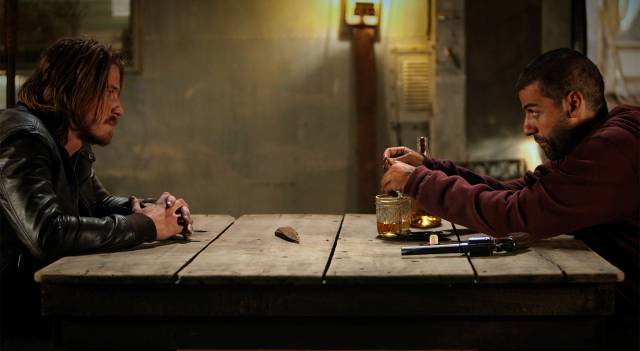
 Mojave opens with an interview of an unidentified star (Garrett Hedlund), unhappy with fame, invoking Byron and Rimbaud and asking, “When you get what you wanted, what do you want?” From there, the next fifteen minutes are an almost entirely wordless montage of his journey into the desert, embracing wilderness and solitude. Like Harry Dean Stanton in Paris, Texas, he goes to the desert to forget his past, to lose himself. But instead of finding peace, he finds Jack (Oscar Isaac), a feral outsider who strolls into his camp one night. The encounter is tense from the onset. Jack is even more allusive, quoting Hamlet and T.E. Lawrence, speculating on the metaphysical immediacy of the desert, and likening their situation to Jesus’ temptation by Satan in the desert, a concordance that hangs over the entire film. Comparing yourself to the devil tends to rub people the wrong way and the encounter turns violent as the star knocks Jack out, yet soon, despite having Jack’s rifle (complete with notches that correspond to killings), he is being hunted by Jack, leading to the star accidentally killing a border officer while Jack watches.
Mojave opens with an interview of an unidentified star (Garrett Hedlund), unhappy with fame, invoking Byron and Rimbaud and asking, “When you get what you wanted, what do you want?” From there, the next fifteen minutes are an almost entirely wordless montage of his journey into the desert, embracing wilderness and solitude. Like Harry Dean Stanton in Paris, Texas, he goes to the desert to forget his past, to lose himself. But instead of finding peace, he finds Jack (Oscar Isaac), a feral outsider who strolls into his camp one night. The encounter is tense from the onset. Jack is even more allusive, quoting Hamlet and T.E. Lawrence, speculating on the metaphysical immediacy of the desert, and likening their situation to Jesus’ temptation by Satan in the desert, a concordance that hangs over the entire film. Comparing yourself to the devil tends to rub people the wrong way and the encounter turns violent as the star knocks Jack out, yet soon, despite having Jack’s rifle (complete with notches that correspond to killings), he is being hunted by Jack, leading to the star accidentally killing a border officer while Jack watches.
Then, however, the star (we now learn his name is Thomas) returns to his life in Hollywood and seemingly shakes off his time and crime in the desert like a bad dream. The tone of the film takes a hilarious shift as Thomas resumes his normal life. He’s going through a divorce, has a film in limbo that might be taken away from him, and encounters some wonderful character performances, from Mark Wahlberg as a coke dealer turned producer with a penchant for hookers and Chinese food, to Walton Goggins as a laconic agent in a snappy white suit. But, as Thomas tries to leave Jack’s world behind, Jack enters Thomas’ world, traveling to Los Angeles where he cleans up his appearance and stalks Thomas. As he moves towards his prey, Jack is devilish, but also devilishly funny; he keeps up a running commentary of hilarious cultural observations, with the candid honesty of a psychopath totally outside the law. The tone becomes darker once more as Jack confronts Thomas. It becomes clear that one man will kill the other and they return to the desert for a final reckoning.
Mojave is a brilliantly strange film, steeped in Hollywood while caring nothing for its conventions. The wild changes in tone and the prevalence of talk over action will alienate many looking for a more conventional thriller, but writer/director William Monahan is clearly aiming at something very different. The dialogue is patently unrealistic, but in the best possible way; it’s ornately crafted, laced with quotes and recurring themes, with both actors speaking as if their souls are in the balance. One could lazily label this as showbiz satire, and small parts of it are, but those elements are mostly just a contrast to the desert and window-dressing for the core conflict. Mojave is ultimately a doppelganger tale, about a social outsider and a famous insider who are innately connected. Jack is an obviously intelligent, yet failed artist, while Thomas is celebrated but unfulfilled; their conflict is not just about life and death but a struggle over the power to shape each other’s realities. Hedlund gives the best performance of his career and Isaac creates the most unforgettable villain since Javier Bardem’s Anton Chigurh (there’s even a dramatic coin flip!). But Mojave knows that villain is a relative term, with Jack asking towards the end, “If we’re Jesus and the devil, have you figured out which is which yet?” Riffing on everything from Shakespeare to Moby Dick, Mojave is a film that wears its intelligence on its sleeve and seeks to understand the dark thoughts that drive men. Consistently surprising and playfully dark, Mojave isn’t for everyone, but others will fall in love with its risk-taking, thematic richness, and outstanding writing.